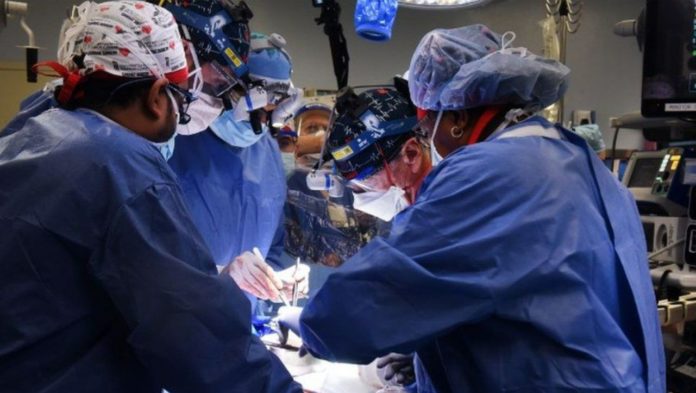US Doctors have successfully transplanted a pig heart into a human patient, a medical first that may offer hope to millions of people whose organs are failing.
The treatment, which used a heart from a genetically modified pig, was a significant step forward in the decades-long search to use animal organs for life-saving transplants.
The pig heart appeared to be working, according to Dr. Bartley Griffith, who performed the eight-hour surgery on Friday at the University of Maryland Medical Center in Baltimore.
“It creates the pulse, it creates the pressure, it is his heart,” Dr Griffith said. “It’s working and it looks normal. We are thrilled, but we don’t know what tomorrow will bring us. This has never been done before.”
On Monday night, the hospital reported that the patient, David Bennett Sr, 57, of Maryland, was doing well.
Mr Bennett was dying, but a regular human heart transplant was out of the question for him.
His family stated he was aware that the experimental operation had no guarantee of success, but he had no choice but to try the pig heart transplant.
Mr Bennett said the day before the operation in a statement released by the hospital: “It was either die or do this transplant. I want to live. I know it’s a shot in the dark, but it’s my last choice.”
His son David Bennett Jr said: “He realises the magnitude of what was done and he really realises the importance of it.
“He could not live, or he could last a day, or he could last a couple of days. We’re in the unknown at this point.”
Mr Bennett had been bedridden for several months prior to the operation.
On Monday, he was still hooked up to a heart-lung bypass machine, which had kept him alive before the procedure.
Doctors stated the new heart was operating and that the equipment may be removed on Tuesday.
Scientists have long attempted to create procedures for using animal organs instead of human organs, a practice known as xenotransplantation, due to a scarcity of human organs for transplantation.
However, prior attempts have failed since the animal organs were quickly rejected by the victims’ bodies.
After receiving a baboon heart transplant in 1984, one newborn named “Baby Fae” in California lived for 21 days.
Pigs are suitable donors because of their size, rapid growth, and big litters, as well as the fact that they are already grown for human use.
The latest experiment used a gene-edited pig heart.
This entailed eliminating a specific sugar from cells that, in earlier attempts, had caused a severe immune reaction and resulted in organ rejection.
“If this works, there will be an endless supply of these organs for patients who are suffering,” said Dr Muhammad Mohiuddin, scientific head of the University of Maryland Medical Center’s animal-to-human transplant program.
“I think you can characterise it as a watershed event,” added Dr David Klassen, the hospital’s chief medical officer.
It was authorised by FDA on “compassionate” grounds because the patient had no other options.
Karen Maschke, a research scholar at the Hastings Center for Bioethics in New York, believes that data from the procedure should be made public before additional patients are given the option of receiving an animal organ transplant.
She said: “Rushing into animal-to-human transplants without this information would not be advisable.”
Last year, over 41,000 patients in the United States received organ transplants, with more than half of those receiving kidney transplants and 3,800 receiving heart transplants.
Approximately 110,000 people in the United States are waiting for an organ transplant, and more than 6,000 people die each year while waiting.
Dr Griffith said: “This was a breakthrough surgery and brings us one step closer to solving the organ shortage crisis.
“We are proceeding cautiously, but we are also optimistic that this first-in-the-world surgery will provide an important new option for patients in the future.”
Image Credit: UNIVERSITY OF MARYLAND SCHOOL OF MEDICINE
You were reading: “It’s my last choice, either die or do” – Man receives Pig heart after 8 hr Breakthrough surgery
